
Cascades is permanently closing a recycled paper mill and two corrugated converting plants due to market conditions and other factors. | Pitipat Wongprasi/Shutterstock
North American fiber packaging giant Cascades announced that a recycled paper mill and two corrugated converting plants have closed permanently, citing a handful of factors including market conditions.
Kingsley Falls, Quebec-headquartered Cascades on Feb. 13 announced its Trenton, Ontario, mill will not reopen. The mill was previously idled. The company also announced two converting plants – which take the linerboard and corrugated medium from mills and turn it into finished packaging products – will close. Those plants are located in Bellville, Ontario, and Newtown, Connecticut.
The Trenton mill used about 55% recycled fiber and 45% virgin fiber, according to the company. Its output was linerboard and corrugated medium, and it had a capacity of 175,000 short tons per year. The converting plants had a capacity of 500 million square feet of finished corrugated packaging. A Cascades spokesperson did not respond to questions about the net output and feedstock capacity change from the recent facility closures.
Some of the production will shift to Cascades’ Bear Island, Virginia, recycled fiber mill, which has an output capacity of 465,000 short tons per year. It started up last year.
In a statement, the company said its interest in “maximizing the performance of its assets, and the combination of the current market environment, higher operating costs, aging technology and the need for significant capital investment were the determining factors in the decision to cease operations at the facilities.”
Besides the Bear Island mill, the closure leaves Cascades with recycled corrugated mills in Niagara Falls, New York; Kingsley Falls, Quebec; Cabano, Quebec; and Mississauga, Ontario.
The corrugated facility closures will be completed by May 31. They come nearly a year after Cascades closed multiple facilities in its tissue division, including plants that used recycled feedstock.

